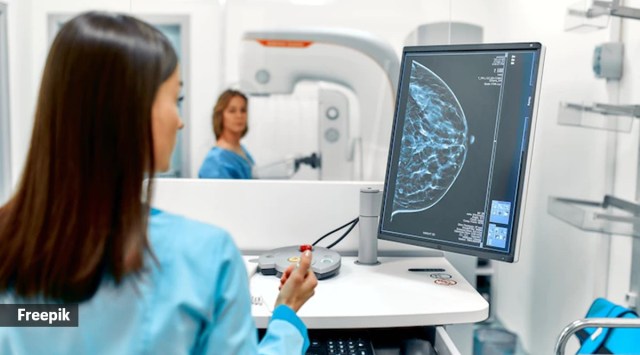- India
- International
Women’s Day: Tests women over 25 should take to prevent risk of heart disease, diabetes and cancer
Routine screening can help detect conditions early, when they are most treatable, and improve overall health outcomes, says Dr Venkatesh D B, Senior Consultant and HOD, Clinical Biochemistry, Neuberg Diagnostics
 The common diagnostic tests that women should consider taking after the age of 25 are as follows, (Source: Freepik)
The common diagnostic tests that women should consider taking after the age of 25 are as follows, (Source: Freepik) Written by Dr Venkatesh DB
Diagnostic tests are an important part of women’s healthcare and there are several of them that women should undergo after the age of 25 to ensure their overall health and well-being. The common diagnostic tests that women should consider taking after the age of 25 are as follows:
Pap Smear: A pap smear is one of the important diagnostic tests recommended for screening of cervical cancer. The test involves collecting cells from the cervix, which are then examined for the presence of abnormalities that indicate growth or pre-cancerous changes. Early detection leads to better outcomes. If these changes are detected, further treatment can be done to prevent cervical cancer from developing. Women should undergo pap smears after the age of 30 at least once in five years, if opting for liquid-based cytology, commonly known as the LBC mode, or once in three years if choosing the conventional mode. LBC has the potential to detect a particular type of mutated Human Papilloma Virus (HPV) that is strongly associated with cervical cancer. It is also advisable for women to get vaccinated for HPV infection, which is an avoidable cause of cervical cancer.
Periodic Screening with Mammogram: Self-examination of the breast is the best way to detect any early changes in its structure. This can help women detect even minor changes that can prove immensely beneficial. A mammogram is a highly sensitive screening tool that uses low dose X-rays to detect breast cancer. This test can identify very small tumors that cannot be felt by physical examination, making it an effective way to detect the disease early and begin treatment. According to the American Cancer Society guidelines, women aged between 45 and 54 years, with an average risk of breast cancer, should have a mammogram annually. Women aged more than 55 years can undergo biennial mammograms or continue annually. Women can continue to be screened with mammograms as long as their overall health is good with a life expectancy of 10 years or more.
A pelvic examination, on the other hand, helps check the health of your reproductive organs, including your vagina, ovaries, fallopian tubes, uterus, vulva and cervix. If you notice symptoms such as vaginal bleeding, cysts, have suffered from a sexually transmitted disease or have a family history of cancer, get these tests done more frequently.

Osteoporosis Detection with Bone Density Test: A bone density test assesses the strength of bones, enabling early detection of osteoporosis. This condition is more prevalent among women after menopause, and a bone density test can determine the risk of fracture and the need for treatment. Women who are 65 years or older should have a bone density test every two years or earlier if they have a high risk of developing osteoporosis.
Lipid Profile and Metabolic Screening: Lifestyle changes in working women and the stress brought about thereupon make them vulnerable to developing high blood pressure, diabetes and heart diseases. Women over 25 should have their blood pressure checked at least once a year. The lipid profile measures total cholesterol levels, and it is crucial to regularly check these levels as they can increase the risk of heart disease and stroke. Women who are 25 years or older should undergo a lipid profile test every five years and HbA1c test at least once a year. However, if they have a family history of heart disease or have developed high blood pressure or diabetes during pregnancy, which continues to exist even after delivery of the child, they should consider getting the test done more frequently. Smoking increases the risk of heart disease in women more than men. Cancer of the lungs is also showing an increasing trend in women as a consequence of smoking. It is advisable for women in high-risk categories to undergo a complete cardio-vascular checkup, including a treadmill test.
Thyroid test: The TSH (thyroid stimulating hormone) test measures this hormone. TSH levels that are too high or too low may be a sign of a thyroid problem. The test is required once in a year to screen for thyroid disorders.
Blood pressure monitoring: High blood pressure is a leading risk factor of heart disease and stroke, and it is important to check it regularly, especially if women have one or more risk factors like obesity or a family history of heart disease.
Diabetes tracking: Doctors say women should get a blood glucose test every three years to check for diabetes or pre-diabetes starting around age 45 or if their blood pressure is above 135/80 or they have high cholesterol levels. Other risk factors include family history and a sedentary lifestyle. A fasting plasma glucose test reading of 100 mg/dl or higher is indicative of prediabetes, while levels greater than 126 mg/dl are suggestive of diabetes. Your doctor might want to look at the post-meal blood sugar readings and HbA1c value to make a final diagnosis.
STD testing: Women are prone to developing Sexually Transmitted Diseases (STDs), especially if having unprotected sex, and some can have serious consequences if left untreated. Sexually active women should be tested for STDs, including HIV, chlamydia and gonorrhea, regularly. Testing is especially important for women with multiple partners as they are at a higher risk of STDs.
It is important to remember that preventive measures, such as regular screening, can help women maintain their health and well-being. Routine screening can help detect conditions early, when they are most treatable, and improve overall health outcomes. Women should discuss their individual screening needs with their healthcare provider to determine the right screening schedule.
Apr 27: Latest News
- 01
- 02
- 03
- 04
- 05








































